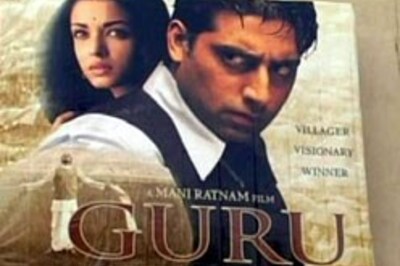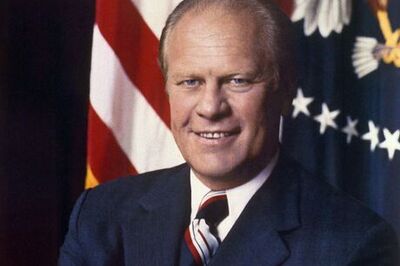
views
How big a deal is this in times when deals themselves are made in crores? Whatever the arguments but for the Madhya Pradesh police could it have happened at a better time.
Imagine the following incidents occurring within a month's time.
Madhya Pradesh DGP Swaraj Puri had to be transferred from the top post after the Economic Offences Wing of the state police registered a case under section 420 of the Indian penal Code against him. The EOW till that day was headed by AR Pawar who took over from Puri as the state DGP. The EOW in fact was asked by an Indore court to look into allegations of Puri getting his son admitted to an engineering college under the NRI Quota. Puri had got the seat financed from one Mr Somani and declared him the grandfather of his son in the admission form. Puri clarified later that the gentleman was the 'mausa' of his wife and since there was no English word to define this relationship he could not help. But the admission laws very clearly said that the financer of the NRI seat had to be in blood relation with the one seeking admission.
In Guna district, Superintendent of police Vivek Sharma was transferred after Inspector VS Sapre was killed by angry Bheels. Over 5000 traditionally armed Bheel tribals had called a 'mahapanchayat' to decide upon the punishment to be meted out to two youths of the Meena community who had allegedly raped a woman of their community. Not just did the state police loose one of its men but also it came under fire for failing to assess the situation. The Bheels gathered in such large numbers and the police had no clue about it. After the police inspector was killed the tribals dispersed for they realized that there could be a heavy crackdown and also the police had not raped their woman. What if they had confronted members of the Meena community?
And those Television images, of a police officer haplessly watching ABVP state organizing secretary Vimal Tomar, showing his fists to professors of a college in Ujjain and shouting choicest expletives at them. The most decent one was his threat to make the professors sweep the floor.
All these events have one thing in common and that is involvement of the police in some way or the other. And one can imagine the kind of impact they would have had on the morale of the force. Hence the question: How big a deal was that of Raman arresting the man trying to bribe him? Also was it the first time that an attempt was made to bribe a police officer like this? If no why were people like Man Singh not caught and arrested. This is not to suggest that every police officer who is offered a bribe accepts it. There may be many who don't accept it but also they do not themselves become complainants and arrest those offering bribes. You talk to police officers about this and they say, "Being a complainant means being party to the case and one would be summoned by the courts. It takes a lot of time and with so many tasks at hand, one can't afford the luxury of spending time in courts."
But then how can you expect the common man to abide by the law and report whenever it is being violated. Can he spare time from his daily responsibilities?
Raman's act may appear to be a one small step but it surely could turn out to be a leap if the morale of state police gets lifted a bit.
About the AuthorHemender Sharma A chance reporter, reporting for CNN-IBN from Bhopal. Has reported for the Sun Magazine, Delhi MidDay, Hindustan Times, Asian Age and Sahara Samay in ...Read Morefirst published:October 11, 2006, 02:23 ISTlast updated:October 11, 2006, 02:23 IST
window._taboola = window._taboola || [];_taboola.push({mode: 'thumbnails-mid-article',container: 'taboola-mid-article-thumbnails',placement: 'Mid Article Thumbnails',target_type: 'mix'});
let eventFire = false;
window.addEventListener('scroll', () => {
if (window.taboolaInt && !eventFire) {
setTimeout(() => {
ga('send', 'event', 'Mid Article Thumbnails', 'PV');
ga('set', 'dimension22', "Taboola Yes");
}, 4000);
eventFire = true;
}
});
window._taboola = window._taboola || [];_taboola.push({mode: 'thumbnails-a', container: 'taboola-below-article-thumbnails', placement: 'Below Article Thumbnails', target_type: 'mix' });Latest News
A police officer arresting someone trying to bribe him is a rarity. But it did happen in MP when a man accused of abetting the suicide of his daughter-in-law tried to bribe Vijay Raman, the additional director general of the Crime Investigation Department (CID). Man Singh offered Rs 50,000 to the state CID chief in return for taking over the investigations of the case. Thankfully he did not succeed. A vigilant Raman not just booked him under the Prevention of Corruption Act but also he himself became the complainant. Perhaps Man Singh did not know he was dealing with the man who killed the dreaded Gazi Baba in Kashmir.
How big a deal is this in times when deals themselves are made in crores? Whatever the arguments but for the Madhya Pradesh police could it have happened at a better time.
Imagine the following incidents occurring within a month's time.
Madhya Pradesh DGP Swaraj Puri had to be transferred from the top post after the Economic Offences Wing of the state police registered a case under section 420 of the Indian penal Code against him. The EOW till that day was headed by AR Pawar who took over from Puri as the state DGP. The EOW in fact was asked by an Indore court to look into allegations of Puri getting his son admitted to an engineering college under the NRI Quota. Puri had got the seat financed from one Mr Somani and declared him the grandfather of his son in the admission form. Puri clarified later that the gentleman was the 'mausa' of his wife and since there was no English word to define this relationship he could not help. But the admission laws very clearly said that the financer of the NRI seat had to be in blood relation with the one seeking admission.
In Guna district, Superintendent of police Vivek Sharma was transferred after Inspector VS Sapre was killed by angry Bheels. Over 5000 traditionally armed Bheel tribals had called a 'mahapanchayat' to decide upon the punishment to be meted out to two youths of the Meena community who had allegedly raped a woman of their community. Not just did the state police loose one of its men but also it came under fire for failing to assess the situation. The Bheels gathered in such large numbers and the police had no clue about it. After the police inspector was killed the tribals dispersed for they realized that there could be a heavy crackdown and also the police had not raped their woman. What if they had confronted members of the Meena community?
And those Television images, of a police officer haplessly watching ABVP state organizing secretary Vimal Tomar, showing his fists to professors of a college in Ujjain and shouting choicest expletives at them. The most decent one was his threat to make the professors sweep the floor.
All these events have one thing in common and that is involvement of the police in some way or the other. And one can imagine the kind of impact they would have had on the morale of the force. Hence the question: How big a deal was that of Raman arresting the man trying to bribe him? Also was it the first time that an attempt was made to bribe a police officer like this? If no why were people like Man Singh not caught and arrested. This is not to suggest that every police officer who is offered a bribe accepts it. There may be many who don't accept it but also they do not themselves become complainants and arrest those offering bribes. You talk to police officers about this and they say, "Being a complainant means being party to the case and one would be summoned by the courts. It takes a lot of time and with so many tasks at hand, one can't afford the luxury of spending time in courts."
But then how can you expect the common man to abide by the law and report whenever it is being violated. Can he spare time from his daily responsibilities?
Raman's act may appear to be a one small step but it surely could turn out to be a leap if the morale of state police gets lifted a bit.




















Comments
0 comment